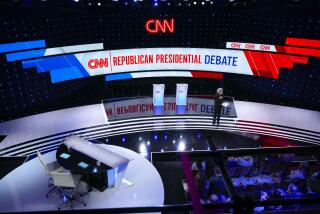WHERE THE CANDIDATES STAND ON / Campaign Reform
- Share via
Background: To counter the effect of money poured into campaigns by special-interest political action committees, whose funds usually go to congressional incumbents, reformers have called for public financing of campaigns and for term limits. Opponents contend that public financing is a waste of taxpayer dollars and that term limits would expel experienced lawmakers from Congress.
President Bush vetoed a congressional campaign-finance bill, calling it a “taxpayer-financed incumbent protection plan.” Bush supports abolishing political action committees, full disclosure of all soft-money expenditures--that is, money spent on behalf of a candidate but not officially by him--and preventing incumbents from creating campaign war chests. Bush backs congressional term limits but opposes public financing.
Patrick J. Buchanan supports congressional term limits and vows to “personally go from state to state” to campaign for the proposal. He is opposed to limiting campaign funds, however. Buchanan says in an ideal system, only voters would be allowed to donate money, not corporations. He is opposed to public financing.
Bill Clinton is opposed to term limits. He supports limiting PAC contributions to $1,000, limiting the amount of money that can be spent in congressional races and requiring television outlets to make time available to candidates. He has accepted no PAC funds and would support a bipartisan agreement to limit contributions to political parties--a major source of soft money. He has not taken a position on public financing.
Edmund G. (Jerry) Brown Jr. favors congressional term limits. He takes no contribution over $100, refuses to accept contributions from political action committees and favors free TV air time for all candidates. He supports public financing.
Federal Spending On Presidential Elections 1976: $43,586,641 1980: $58,540,955 1984: $80,800,000 1988: $92,200,000
More to Read
Get the L.A. Times Politics newsletter
Deeply reported insights into legislation, politics and policy from Sacramento, Washington and beyond. In your inbox twice per week.
You may occasionally receive promotional content from the Los Angeles Times.










